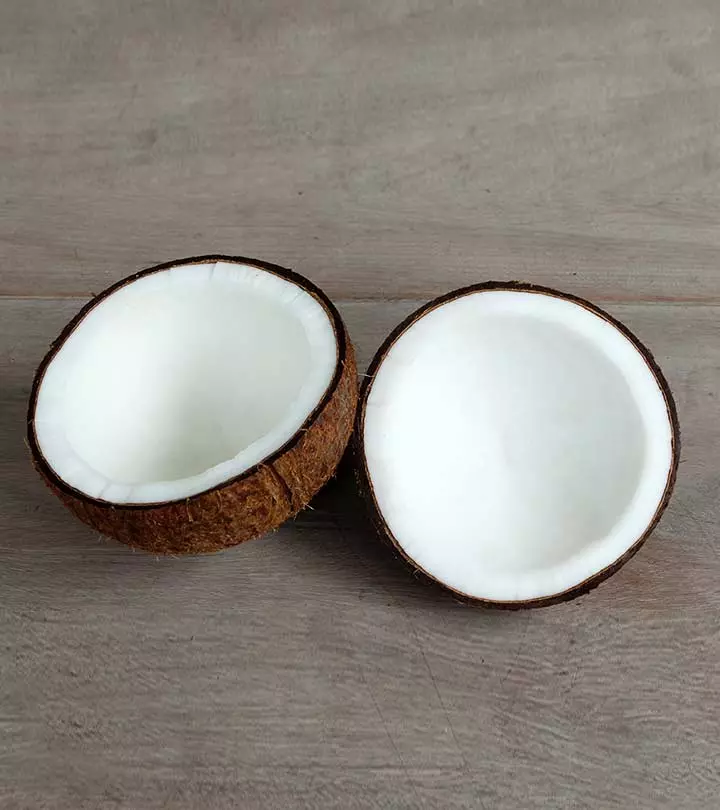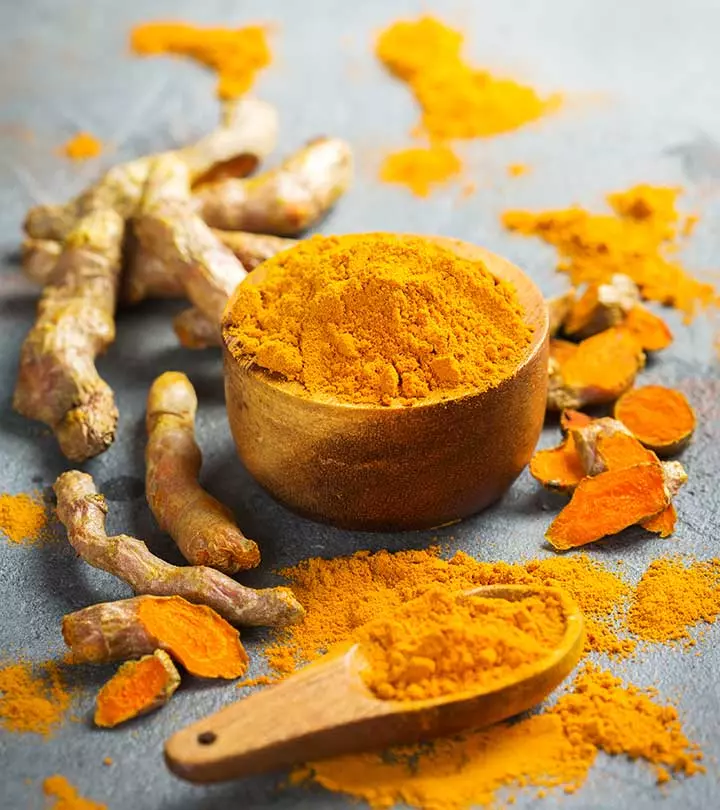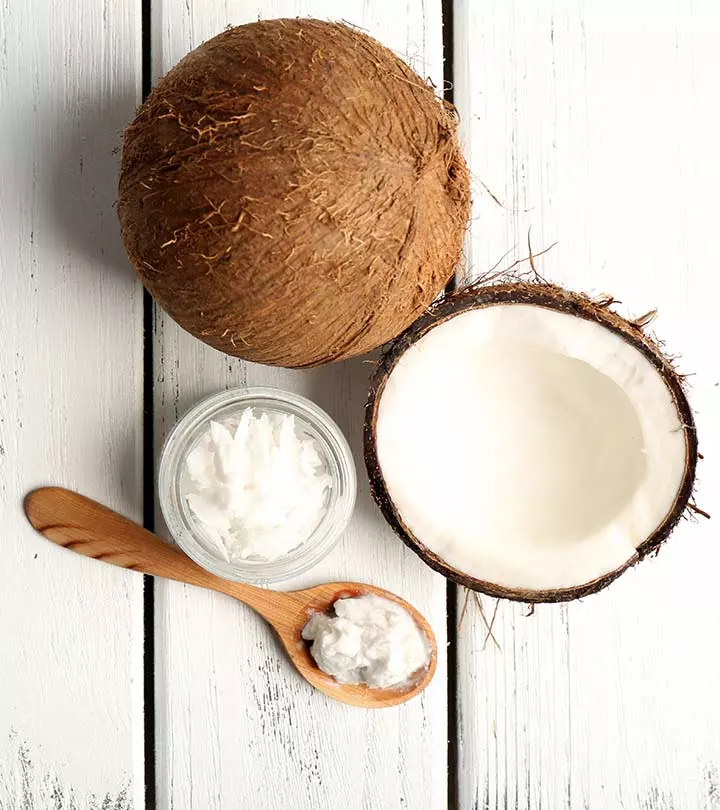9 Benefits Of Taurine, Its Side Effects, And Food Sources
Understand how this amino acid may help you stay fit, manage diabetes, stress, and more.

Image: Shutterstock
Several benefits of taurine have led to it being recognized as a vital amino acid. Energy drinks are commonly flavored with this nutrient. A wealth of research supports taurine as being beneficial. It can help boost your energy, manage obesity and diabetes, and promote heart and brain health. Most studies consider taurine to be essential (1). This article examines the benefits of taurine, including its sources and possible side effects. Take a look.
 Know Your Ingredient: Taurine
Know Your Ingredient: TaurineWhat Is It?
A naturally occurring, sulfur-containing amino acid.
What Are Its Benefits?
It helps regulate blood pressure, boosts metabolism, and improves heart function and blood fat levels.
Who Can Use It?
Anyone can take taurine except people who are pregnant or nursing.
How Often?
You can safely consume taurine every day according to the recommended dosage.
Caution
Taurine can aggravate bipolar disorder and increase lithium levels in the body. Consult your healthcare provider before taking supplements.
In This Article
What Is Taurine? How Does It Work?
Taurine is an amino acid found throughout your body. It is crucial in most metabolic processes. And unlike most amino acids, taurine is not used to build proteins. It has an entirely different role to play.
Your body can produce some amount of taurine, which is why it is also called a ‘conditional’ amino acid. You can get some of it naturally through food. Even taking supplements can help.
 Trivia
TriviaTaurine’s main functions happen in the central nervous system. It aids in its development and offers cytoprotection (where chemical compounds protect cells from harmful compounds). Taurine deficiency can lead to cardiomyopathyi A heart muscle disorder that makes it difficult for the heart to pump blood to the rest of the body. It can lead to heart failure. , renal dysfunction, severe damage to retinal nerves, and even developmental issues (2). Taurine is also significant for cell development and survival, and it is one of the most abundant substances in the ocular tissues.
Taurine also works as an antioxidant, fighting oxidative stress and cellular aging, which may help improve skin health.
Lucas, a YouTuber, shared his personal experience after taking taurine. He said, “Just based on personal experience I know that I subjectively noticed a reduction in internal chatter racing thoughts and general social anxiety when I’m like meeting new people or at a party when I take taurine (i).”
All of this only makes us wonder about taurine’s powerful benefits. Let’s see how it can help you live a better life – in detail.
Key Takeaways
- Taurine may help regulate blood pressure and reduce the chances of heart disease.
- It is full of antioxidants and anti-inflammatory properties that may help reduce inflammation and fight cellular aging.
- Taurine may help in enhancing vision, boosting stamina for physical activities, and supporting muscle function.
- Consume meat, fish, sea algae, or other taurine supplements to get the required dose of taurine.
- It may aggravate bipolar disorder.
What Are The Benefits Of Taurine?
1. Taurine Can Help Fight Obesity
Taurine has a role to play in fat absorption and breakdown. A study done on 30 college students showed how taurine supplementation reduced triglycerides and the atherogenic index (ratio of triglycerides to HDL cholesterol) significantly (3). The study concluded by stating that taurine could positively affect the metabolism of fats and even cut the risk of heart disease in obese individuals.
Taurine levels in tissues were also found to be depleted during obesity in humans. This might establish a relationship between taurine deficiency and obesity (4).
2. Promotes Heart Health

A Japanese study shows the link between increased taurine intake and reduced risk of heart disease (5).
Taurine also helps lower levels of blood cholesterol and blood pressure. Supplementing this amino acid was also found to reduce arterial thickening, which can cause heart attacks. This way, it also reduces hypertension – a major cause of heart failure.
In yet another study, taurine supplementation had reduced homocysteine levels. As high homocysteine levels are associated with heart disease, taurine can work wonders in this aspect (6).
3. Aids Diabetes Treatment
Long-term taurine supplementation was found to lower blood sugar levels in diabetic rats. And interestingly, this happened without any dietary changes (7).
Treating with taurine also prevented diabetes onset as it had suppressed the impending hyperglycemia (8). And as per reports by the American Diabetes Association, diabetes is characterized by taurine deficiency. This deficiency is also linked to diabetic retinopathyi High blood sugar levels damage blood vessels in the retina and the tissue in the back of the eye, which results in this disorder. , neuropathy, and nephropathyi A term used to indicate damage to blood vessel clusters in the kidneys that filter waste from the blood, which can lead to kidney failure. (9).
4. Fights Stress And Boosts Brain Health
A Chinese study shows how taurine can exhibit anti-depressive effects
and improve the symptoms of depression. It can also contribute to brain function and development and help improve memory and cognition. (10).
Taurine was also found to activate the GABA receptors in the brain – these receptors interact with some key neurotransmittersi Chemical messengers responsible for transporting chemical signals from one nerve cell to the subsequent target cell. that promote brain development (11).
5. Promotes Liver health

Studies show that taurine can reverse liver injury caused by excessive alcohol consumption. In tests conducted on rats, those ingested with taurine showed reduced rates of fatty degradation and inflammation (12).
Dietary supplementation of taurine also reduced liver injury in patients with chronic hepatitis (13).
Taurine also protects your liver from oxidative stress and free radical damage. In a study, 2 grams of taurine taken thrice a day had reduced liver damage due to oxidative stress (14).
6. Taurine Enhances Vision
The fact that taurine is the most abundant amino acid in the retina explains a lot. Taurine has powerful antioxidant properties that can help boost retinal health and prevent vision ailments (15).
Taurine depletion has also been associated with damage of the retinal cones and retinal ganglion cells. The amino acid can also prevent cataracts and dry eyes – which makes it an important nutrient for eye health (16).
7. Boosts Exercise Performance

Studies show how taurine enhances exercise performance. The amino acid also helps reduce exercise-induced muscle fatigue (17).
In rats ingested with taurine, the duration of running time to exhaustion had significantly gone up – which means that taurine may help one perform physical activity for longer periods without getting exhausted.
8. Combats Inflammation
The primary role of taurine in the human system is as an antioxidant – which is one reason it helps fight inflammation in the body. Studies also promote the use of taurine in drugs to fight chronic inflammatory diseases (18).
Taurine also aids the treatment of periodontitis, which is the inflammation of tissues around the teeth (19).
9. May Protect Cognitive Health
Taurine may offer neuroprotection through various mechanisms. It helps preserve brain function by offering protection against the harmful effects of various disorders that can otherwise impact cognitive health. It also helps maintain the calcium balance in the body and controls inhibitory neurotransmission (the process in which the brain’s chemicals tell the nerve cells to slow down their signals). These functions are critical for brain health. Taurine levels are often disrupted in metabolic and neurodegenerative disorders, impacting the brain’s well-being. But, taurine supplementation may help combat this problem (20). However, more scientific research is warranted for a clear understanding of the mechanism by which taurine offers neuroprotection. Consult your doctor before trying taurine supplementation.
That’s about the various ways in which taurine benefits your health. As we saw, taurine is not like most of the other amino acids. It has a different purpose. That takes us to the next question – how do you get enough of taurine? What are the food sources?

Adults are capable of synthesizing taurine to some extent – with the help of methionine and cysteine, two essential amino acids. Apart from that, we need to look at food sources like:
- Fish – They contain high levels of taurine. These include whole capelin (6.17 grams per 1 kilo), cooked dungeness crab (5.94 grams per 1 kilo), whole mackerel (9.29 grams per 1 kilo), and Alaskan salmon fillets (4.40 grams per 1 kilo).
- Meat – Deboned beef (197 mg per 1 kilo), beef liver (2.35 grams per 1 kilo), lamb (3.67 grams per 1 kilo), and chicken liver (6.67 grams per 1 kilo).
- Sea Algae And Plants – Sea algae contains some taurine, though vegetables grown on land contain none.
 Did You Know?
Did You Know?Human breast milk also has an excellent supply of taurine, so, for infants, this can be a great source (as their bodies cannot generate taurine yet). Taurine is also being added to baby formula milk and powder, given its importance in growth and development.
What if you are a vegetarian? What if you don’t have access to these limited food sources of taurine? Then, you may want to check out supplements.
What About Taurine Supplements (And Energy Drinks)?
If you are a strict vegetarian or a vegan, you can get your daily dose of taurine through supplements. You can also go for supplements if you are an athlete looking to improve your performance.
But when we say supplements, we don’t necessarily mean energy drinks. Though they contain high amounts of taurine, energy drinks also contain other ingredients (like caffeine and sugar) in undesirably excess quantities. Too much of caffeine can elevate blood pressure, and excess sugar can wreak havoc on your health. So, we recommend you stay away from energy drinks if your sole objective is to meet your daily taurine needs.
You are likely to become deficient in taurine in the following cases:
- You are a strict vegetarian or a vegan.
- You are deficient in methionine or cysteine, which is what the body uses to synthesize taurine.
- You are deficient in vitamin B6, which is also required by the body for taurine synthesis,
- Health conditions like cancer, hypertension, diabetes, liver disease, and epilepsyi A condition in which the brain’s nerve cell activity is disrupted, leading to seizures. Trauma or stroke can often trigger it. .
Your taurine dosage should not exceed 3,000 mg per day. Otherwise, complications might arise.
What Are The Side Effects Of Taurine?

- Issues With Pregnancy And Breastfeeding
There is not enough information in this regard. Stay safe and avoid use.
- Might Aggravate Bipolar Disorder
Some sources suggest taurine may aggravate bipolar disorderi A mental health condition characterized by episodes of abrupt mood swings. Genetics, environment, and brain chemistry may play a role in it. . People with this condition should avoid its use.
- Interactions With Lithium
If you are taking lithium, talk to your doctor. Taurine can increase the serum lithium levels and may lead to lithium toxicity. Your dosage must be adjusted accordingly.
Infographic: 5 Ways Taurine May Improve Your Health
Taurine is an amino acid that plays an essential role in different bodily functions. Consuming taurine-rich foods may improve your vision, fight oxidative stress, and reduce the risk of diabetes. Check out the infographic below to learn about the various ways in which this amino acid may improve your overall health and well-being.

Illustration: StyleCraze Design Team
Taurine is a small sulfur-containing amino acid. Your body naturally produces taurine, and it is crucial for supporting many metabolic reactions in the body. This conditional amino acid may help fight obesity, promote heart health, aid in diabetes treatment, provide stress relief, regulate cholesterol, boost mood and cognitive function, and reverse liver injury caused due to excessive alcohol consumption. Taurine is available in fish, meat, sea algae, and plants. However, an overdose of taurine may cause issues during pregnancy and breastfeeding, aggravate bipolar disorderi A mental health condition characterized by episodes of abrupt mood swings. Genetics, environment, and brain chemistry may play a role in it. , and lead to lithium toxicity. Hence, consume it in the recommended dosage levels and consult a healthcare provider before using it to avoid its adverse effects and enjoy its maximum benefits.
Frequently Asked Questions
Is taurine good for anxiety?
Yes. Taurine’s relaxing effects on the nervous system indicate that it may aid with anxiety (21). Neurotransmitters that help in stress reduction and relaxation, such as GABA, are supported by taurine (22). Additionally, this amino acid has antioxidant properties and may promote normal brain activity, which may help reduce feelings of anxiety in some individuals.
Is taurine good for sleep and improving sleep quality?
Maybe. Animal studies show that it may have sedative properties, which may help improve sleep quality. However, further studies are warranted to support this claim (24).
Does taurine increase serotonin?
No. Taurine inhibits and controls the release of serotonin (23).
Can taurine cause kidney damage?
Maybe. While taurine regulates many kidney functions and protects against kidney disorders, excess supplementation may cause kidney damage (25), (26).
Can you take taurine and magnesium together?
Yes. Both supplements work well together and supplement each other’s functions.
Can taurine support the immune system?
Yes. The benefits of antioxidants present in taurine are many. They aid in reducing oxidative stress, which may help boost the immune system and promote longevity (18).
Illustration: Benefits Of Taurine Its Side Effects And Food Sources

Image: Stable Diffusion/StyleCraze Design Team
Discover the top 10 health benefits of taurine supplements! Click on the video below to learn how this powerful amino acid supplement can help improve your overall health and well-being.
Personal Experience: Source
StyleCraze's articles are interwoven with authentic personal narratives that provide depth and resonance to our content. Below are the sources of the personal accounts referenced in this article.
i. Taurine Reduces Social Anxiety? (Taurine Benefits)https://www.youtube.com/watch?v=2haBirFm25E
References
Articles on StyleCraze are backed by verified information from peer-reviewed and academic research papers, reputed organizations, research institutions, and medical associations to ensure accuracy and relevance. Read our editorial policy to learn more.
- “Review: taurine: a “very essential” amino acid”. Molecular vision, US National Library of Medicine.
- “Review: taurine: a “very essential” amino acid”. Molecular vision, US National Library of Medicine.
- “Beneficial effects of taurine…”. Amino Acids, US National Library of Medicine.
- “Role of taurine in the pathogenesis of obesity”. Molecular Nutrition and Food Research, US National Library of Medicine.
- “Taurine and atherosclerosis”. Amino Acids, US National Library of Medicine.
- “Effect of taurine supplementation on plasma…”. Advances in Experimental Medicine and Biology, US National Library of Medicine.
- “Taurine ameliorates hyperglycemia…”. Experimental & Molecular Medicine, US National Library of Medicine.
- “The potential usefulness of taurine on diabetes…”. Amino Acids, US National Library of Medicine.
- “Taurine intestinal absorption and renal…”. American Diabetes Association.
- “Antidepressant effect of taurine…”. Scientific Reports, US National Library of Medicine.
- “Scientists close in on taurine’s…”. Weill Cornell Medicine.
- “Effect of taurine on alcoholic liver disease…”. Advances in Experimental Medicine and Biology, US National Library of Medicine.
- “Dietary amino acid taurine ameliorates liver injury…”. Amino Acids, US National Library of Medicine.
- “The protective effect of taurine against…”. Advances in Experimental Medicine and Biology, US National Library of Medicine.
- “Taurine: the comeback of a…”. Progress in Retinal & Eye Research, US National Library of Medicine.
- “Taurine is a small sulfur amino acid…”. Handbook of Nutrition, Diet and the Eye. ScienceDirect.
- “Effects of taurine administration on exercise”. Advances in Experimental Medicine and Biology, US National Library of Medicine.
- “Taurine and inflammatory diseases”. Amino Acids, US National Library of Medicine.
- “Evaluation of the efficacy of taurine as an antioxidant in…”. Dental Research Journal, US National Library of Medicine.
- Taurine Supplementation as a Neuroprotective Strategy upon Brain Dysfunction in Metabolic Syndrome and Diabetes
https://pubmed.ncbi.nlm.nih.gov/35334949/ - Taurine induces anti-anxiety by activating strychnine-sensitive glycine receptor in vivo
https://pubmed.ncbi.nlm.nih.gov/17728537/ - Taurine and Astrocytes: A Homeostatic and Neuroprotective Relationship
https://pmc.ncbi.nlm.nih.gov/articles/PMC9294388/ - Central Taurine Attenuates Hyperthermia and Isolation Stress Behaviors Augmented by Corticotropin-Releasing Factor with Modifying Brain Amino Acid Metabolism in Neonatal Chicks
https://www.ncbi.nlm.nih.gov/pmc/articles/PMC8781603/ - Glutamate GABA glycine and taurine modulate serotonin synthesis and release in rostral and caudal rhombencephalic raphe cells in primary cultures
https://pubmed.ncbi.nlm.nih.gov/7693110/ - Taurine and the renal system
https://www.ncbi.nlm.nih.gov/pmc/articles/PMC2994373/ - Taurine Red Bull or Red Herring?
https://www.ahajournals.org/doi/10.1161/HYPERTENSIONAHA.109.130427
Read full bio of Heather M. Duquette-Wolf
Read full bio of Ravi Teja Tadimalla
Read full bio of Arshiya Syeda
Read full bio of Sindhu Koganti



























Community Experiences
Join the conversation and become a part of our empowering community! Share your stories, experiences, and insights to connect with other beauty, lifestyle, and health enthusiasts.